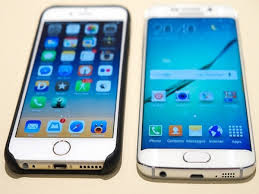iPhone 6s Vs. Galaxy S6 Biography
Source(google.com.pk)The Apple iPhone 6s and the Samsung Galaxy S6 are more similar than you might think. With such capable devices, it's hard to go wrong no matter which you choose. If you're in the market for a flagship handset here are the main points to consider.
Samsung's screens are bigger and denser. The Galaxy S6 has a 5.1-inch display with 2,560 by 1,440 resolution, while the iPhone 6s has a 4.7-inch screen with 1,344 by 750 resolution. That's a pixel count of 3.86 million to 1.0 million, respectively. Similar comparisons can be made between the iPhone 6s Plus (5.5-inch screen at full HD resolution) and the Galaxy Note 5 (5.7-inch screen at quad HD resolution).
The trade-offs are, of course, size and weight. The Galaxy S6 measures 5.65 by 2.78 by 0.27 inches and weighs 4.87 ounces, while the iPhone 6s measures 5.44 by 2.64 by 0.28 inches and weighs 5.04 ounces.
Apple's new iPhone 6s flagship brings with it 3D Touch, which adds a new dimension to the ways users can interact with apps. Third-party app writers have yet to show us exactly how creatively they'll put this technology to use, but the prospects are exciting.
It's too early to make any comparisons with respect to battery life, but the phones will probably be on even ground. The Galaxy S6 has a 2,560mAh battery, but many find it doesn't quite last through a full day. The iPhone 6s has a 1785mAh battery and new power management software. It remains to be seen just how long it lasts.
Samsung's battery, however, will charge faster and in more convenient ways. The Galaxy S6 has rapid-charging technology that delivers a full charge in about 90 minutes. It can also charge wirelessly. The iPhone 6s can't charge rapidly or wirelessly.
Neither phone allows users to access or swap the battery.
Storage capacity is a mixed bag. The iPhone 6s comes in 16GB, 64GB, and 128GB models, while the Galaxy S6 comes in 32GB, 64GB, and 128GB models. Neither supports removable storage, but cloud-based storage options abound.
There are plenty of similarities. Both handsets support Category 6 LTE, but final wireless speeds are subject to the network operator as it is. The only (minor) advantage enjoyed by the iPhone 6s is wider support for LTE bands around the world. Both handsets have their maker's best processor: the A9 in the iPhone 6s and the Exynos 7420 in the Galaxy S6.
[Read about what Apple left out of the iPhone 6s.]
Each includes the latest Bluetooth, GPS, and WiFi radios, in addition to fast and accurate fingerprint sensors. The fingerprint sensors permit biometric security. They serve as the gateway to Apple Pay and Samsung Pay, respectively.
Pricing is another area where consumers will feel plenty of pain no matter which phone they pick. Both phones start at $649 and climb to near $1,000 for the top-end variants.
Other than the screens, perhaps the biggest differentiator is the ecosystem. The iPhone runs on Apple's iOS, and the Galaxy S6 relies on Google's Android platform. Each has its pros and cons. If you've spent lots of money amassing a vast collection of content through either iTunes or the Google Play Store, then it is probably best to stick with the ecosystem in which you're already invested.
Still can't decide? You'll be able to go to carrier stores on Sept. 25 and check out both phones side-by-side. In addition, keep us up-to-date about your opinion in the comment section.
iPhone 6s Vs. Galaxy S6
iPhone 6s Vs. Galaxy S6
iPhone 6s Vs. Galaxy S6
iPhone 6s Vs. Galaxy S6
iPhone 6s Vs. Galaxy S6
iPhone 6s Vs. Galaxy S6
iPhone 6s Vs. Galaxy S6
iPhone 6s Vs. Galaxy S6
iPhone 6s Vs. Galaxy S6
iPhone 6s Vs. Galaxy S6
iPhone 6s Vs. Galaxy S6

iPhone 6s Vs. Galaxy S6
iPhone 6s Vs. Galaxy S6
iPhone 6s Vs. Galaxy S6
iPhone 6s Vs. Galaxy S6
samsung galaxy s6 unboxing uk review and comparing with i phone 6 plus
Slow-motion bouncing i Phone vs S6 - Rachel Williams' bounces her fun bags in super slow-mo!!













No comments:
Post a Comment